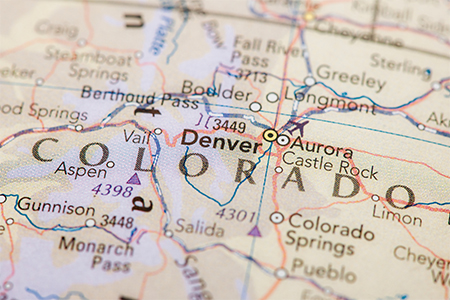You May Also Like
COLORADO CPA EXAM & LICENSE REQUIREMENTS 2024

Learn about the requirements you’ll need to meet to become a CPA in Colorado. A career in accountancy is hard to attain and full of rich rewards. While it does involve meticulous attention to detail, it also is concerned with bigger-picture issues such as the direction a company should take, or how a family accumulates and disperses wealth. One of the more common accountancy careers is in taxes, but accountants are found performing corporate audits, in IT departments and in corporate boardrooms in the role of Chief Financial Officer or even Chief Executive Officer. Most of these top executives are licensed CPAs in their state. If you live in Colorado, or wish to practice accountancy there, you may wonder how to become a CPA. Keep reading to learn more.
General Requirements
Though you do not need to be a citizen of the United States or a resident of Colorado, you will need a Social Security number. If you do not have a SSN, you must submit a Social Security Number Affidavit that affirms that you are not a U.S. citizen but are applying for an accountancy license in the state of Colorado. This affidavit must be signed and notarized to become a part of your application. The Colorado State Board of Accountancy (CBA) has a specific set of requirements for potential CPAs. These include standards for education, testing, ethics and experience. These regulations are always subject to change, so it is wise to keep an eye on the board’s most current requirements prior to applying. In fact, they revised the regulations for education in July, 2015.
Education
The educational requirements for Colorado are not that different from many other states. The CBA requires that you complete a bachelor’s degree and then 30 semester hours after you pass all four portions of the CPA examination, totaling 150 hours. The 30 post-exam hours must be completed within five years of your passing the test. Within those 150 hours, you must meet specific coursework requirements. If you are attending a Colorado-based college or university, your academic advisor in the Business or Accounting department may be aware of these requirements and can help you achieve your goals. 27 semester hours must be in upper-level courses with titles/subject matter such as these:
- Ethics in accounting
- Research and analysis in accounting
- Accounting and information systems
- Theories of accounting
- Financial reporting for non-profit organizations or government agencies
- Financial reporting for private, for-profit businesses
- Fraud
- Financial statements & analysis
- Cost accounting
- Taxes, research and analysis
- Three hours in accounting ethics
Six hours in auditing courses:
- Three hours applying Generally Accepted Auditing Standards (GAAS)
- Three hours in:
- Advanced audits
- Fraud
- Auditing information systems
- Some subset of general auditing
You will also need 27 hours in upper-level business administration courses that can include the following:
- Three required hours studying business communication, technical writing and communication and accounting communications
- Business law
- Organizational behavior
- Business ethics
- Business communication
- Economics
- Finance
- Information systems
- Marketing
- Management
- Legal and social environment of business
- Statistics
- Quantitative applications
CPA Exam
Once you have completed your bachelor’s degree, you can apply to take the Certified Public Accountants exam. This is a standardized test administered by the American Institute of Certified Public Accountants (AICPA) and is comprised of four separate tests:
- Financial Accounting and Reporting
- Auditing and Attestation
- Regulation
- Business Environment and Concepts
Ethics Exam
Once you have passed the CPA exam, you can move on to take the AICPA’s ethics exam. This test is part of a self-study packet that includes a CD-ROM that will provide 11 hours of instruction. The test is open book and is not considered to be terribly difficult, but it is a vital part of the licensure process, so be sure to take care while studying. The test must be passed with a score of 90.
Experience or Additional Education
While many may choose to return to school to complete the additional 30 semester hours of undergraduate instruction as advised under the educational requirements, others may want to enter an accounting firm to complete the post-exam requirements. Still others may wish to continue on to complete a master’s-level degree. For those who choose the professional world route, it is vital that your work experience meet specific requirements. First off, you will need to work full-time for one year, and complete 1,800 hours of verifiable work under an CPA licensed by the CBA. You may choose to work either in public accounting, private industry, governmental agencies or academia. The skill requirements for each are as follows:
Public Accounting
- Attestation
- Accounting
- Reporting on financial statements
- Consulting
- Advising management
- Tax returns
- Taxation advisement
Private Industry
- Internal auditing
- Internal control systems
- Prepare financial statements
- Advising management
- Consulting
- Tax returns
- Taxation advisement
Governmental
- Internal or external auditing
- Install control systems
- Prepare financial statements
- Advising management
- Consulting
- Tax returns
- Taxation advisement
Academia
- Teaching accounting at an accredited college or university
- Teach two upper-division accounting courses
- 12 semester hours (or quarter system equivalent)
- Non-accounting courses do not count towards licensure
- If you teach for multiple institutions, an accounting of the hours you taught must be signed by your dean or department chairperson
A Certificate of Experience from the state of Colorado must be submitted from each employer. Your supervisor will need to return the completed form to you in a sealed envelope that will accompany your application. For the most up-to-date information on Colorado’s requirements for future and current CPA licenses, please visit the state board’s website: Colorado State Board of Accountancy.